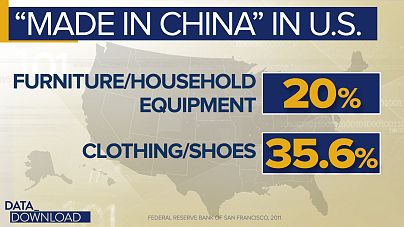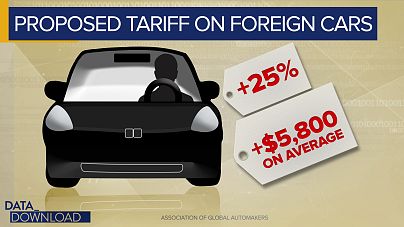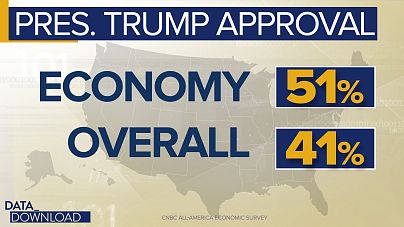Trade wars are messy, with impacts that are difficult to forecast, but one group that generally takes a hit is consumers (also known as voters).
Throughout a bumpy, controversial presidency, Donald Trump has consistently celebrated one bit of good news, the numbers around the economy - a climbing stock market and a falling unemployment rate. Now, the president's trade war, which went to another level Friday by targeting anew 1,000-plus Chinese products, threatens to eat into that very strength.
Trade wars are messy, with impacts that are difficult to forecast, but one group that generally takes a hit is consumers (also known as voters). And analysts say this one looks no different.
To be clear the good economic numbers that have accompanied the Trump presidency are real. Economic growth under since the president's inauguration has been steady and unemployment has fallen to numbers not seen since 2000.
This past Friday official numbers showed the U.S. economy beat expectations and added more than 200,000 jobs in June.
How much credit you want to give Trump for those numbers probably depends at least somewhat on your political lean. Democrats often note, correctly, that those positive trends began under President Barack Obama. But, as Republicans also correctly note, they continued under Trump. It is his economy now.
That's why analysts have raised eyebrows at the trade war that Trump has started and stoked.
As many economists have noted, there are winners and losers in trade wars. Some sectors thrive with government help, others struggle as foreign governments target them - such as soybean farmers in counties that largely voted for Trump, as Data Download recently explained.
But beyond those specifically targeted effects, consumers almost always feel some pain. One analysis from Moody's Analytics, predicts that the trade disputes launched by Trump will cost the United States .2 percent in economic growth, some 250,000 jobs and an additional $210 in higher costs per family, on average.
And the numbers get more remarkable when you zoom in on explicit products and the kinds of products affected by the trade fight.
Some of the tariffs that the U.S. government put on Chinese products hit at very specific items, such as solar panels. Those tariffs will add $500 to $1,000 to the total cost of solar panel installation, according to the firm Energy Sage.
But others are much broader and more likely to hit a wide range of consumers, such as U.S. tariffs on Chinese steel and aluminum. Those metals go into many products, including home appliances, where the cost impacts could be more noticeable. Jonathan Gold, an official at the National Retail Federation predicted prices of appliances, from water coolers to mini fridges, could rise 25 percent after the tariffs began.
And Trump is considering a 25 percent tariff on imported cars that could cost consumers on average $5,800 per foreign vehicle, according to the Association of Global Automakers, which includes the Big Three automakers in metro Detroit.
These consumer impacts are not lost on the Trump Administration. In fact, between the original China tariff target list this Spring and the final list this summer, the U.S. eliminated some products they figured were consumer favorites, such as flat-screen TVs.
That will take some sting out of the tariffs, of course, but when you need to buy a new thermostat or sedan you need to buy one and if your product isn't exempted, you're out of luck. And, of course, there are the small price increases that will come across the board, such as the much-discussed cost impact of "aluminum can tariffs" on beer drinkers.
Again, all of this has special meaning for Trump - and for Republicans, who have been largely unsure of how to challenge him on trade - because the economy is one area where Trump is doing well with voters.
A CNBC poll in late June, Trump's overall approval was only 41 percent, but his approval on handling the economy was a full 10 points higher, 51 percent.
Politically speaking, those poll numbers show the complicated challenge Trump faces on the trade issue.
As Trump's job approval numbers slumped, his base remained loyal. In a very real sense, he owes those voters, and the tariffs are keeping a promise he made to them. But as he pursues a trade war strategy, he risks damaging the strong economy that has kept him afloat with other voters.
As the trade war goes on, or even grows, in the next few months, movement in those two approval numbers will likely reveal a lot about the fate of Trump's presidency.














